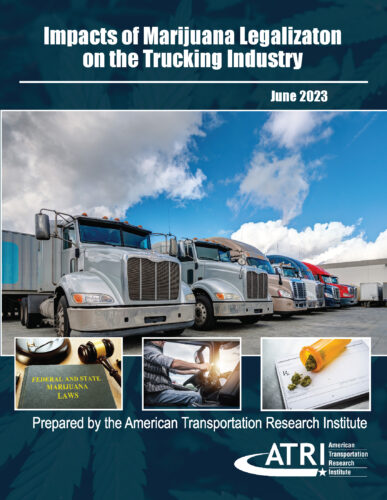ATRI Releases New Research that Evaluates the Impacts of Marijuana Legalization on the Trucking Industry and its Workforce
The ATRI study documents the strategies and implications of the two pathways the federal government can take in response to advancing legalization efforts
The American Transportation Research Institute (ATRI) released a new report that assesses the impacts of marijuana legalization on the trucking industry. The analysis, which was a 2022 top priority of ATRI’s Research Advisory Committee (RAC), covers several critical topics related to state-level marijuana legalization, including:
- a review of the latest demographic trends in marijuana legalization;
- an overview of research and data related to highway safety and marijuana use;
- a summary of workforce and hiring implications for the trucking industry; and
- an analysis of publicly available CDL driver drug test data.
Additionally, the report includes industry surveys that provide insight into motor carrier and truck driver perspectives on the consequences of marijuana legalization and current drug screening regulations. The data collected show that drivers and carriers are equally frustrated with current drug testing limitations, in particular the lack of a test for marijuana impairment.
“Minnesota recently joined the growing list of states legalizing recreational marijuana. This action underscores the critical need for tools to effectively determine marijuana impairment by current and prospective employees. As an industry committed to workplace and roadway safety, we owe it to ourselves and our families to make sure we can screen to maintain a clean and sober workforce,” said Minnesota Trucking Association President John Hausladen.
The ATRI study documents the strategies and implications of the two pathways the federal government can take in response to advancing legalization efforts.
The first pathway, maintaining the current prohibition policy where marijuana remains a Schedule I drug, would continue the trend of removing thousands of drivers annually from the industry through positive tests for past marijuana use.
The second pathway, a scenario where the federal government eases restrictions and possibly removes marijuana from the Schedule I designation, has significant challenges as well. Prior to any federal legalization action, the report identifies several protections that must be in place for employers in safety-sensitive industries. These include the development of a nationally recognized marijuana impairment test and impairment standards, as well as provisions that protect a carrier’s ability to screen employees for drug use.
A copy of the full report is available through ATRI’s website here.
Category: Driver Stuff, Featured, General Update, Management, News, People, Safety, Training, Transit News











